
views
X
Research source
Dietary Changes

Purchase organic foods whenever possible. Many of the herbicides, pesticides, and antibiotics used in commercial farming contain toxins. It’s possible that some of these toxins act similarly to estrogen when you ingest them, which can throw off your body’s hormone balance. To avoid this, purchase food items bearing a green “USDA Organic” seal whenever you can. If you live outside the U.S., get familiar with your country’s organic food labeling regulations so that you know what to look for. For instance, if you live in the European Union, look for the organic logo, which looks like a leaf with a star border on a green background.

Eat more cruciferous vegetables. Many cruciferous vegetables contain a large amount of indole-3-carbinol. Once inside the body, indole-3-carbinol helps block the activity of certain types of estrogen. This may decrease your risk of estrogen-related health problems, such as some types of cancer. Common cruciferous vegetables include: Broccoli Brussels sprouts Cabbage Cauliflower Kale

Consume foods that contain anti-estrogen enzymes. While many foods contain elements that mimic estrogen, some have enzymes like ellagitannin, naringenin, and apigenin that block the production or spread of the sex hormone. Depending on the specific food, this is done by actively preventing estrogen from binding to cell receptors or by mimicking aromatase inhibitors. Some foods that contain anti-estrogens are: Citrus fruits Mushrooms Onions Celery Asparagus Mustard greens Pomegranates Apples and apple juice Berries Eggplant
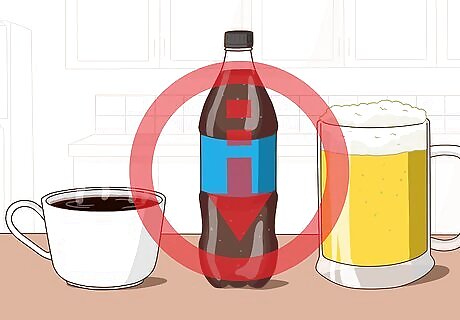
Reduce the amount of alcohol you consume. Beer, bourbon, and many other forms of alcohol contain phytoestrogens that, when consumed, can lead to a general increase of estrogen in your body. Stick to drinking in moderation or cut out alcohol altogether if you’re worried about how it’s affecting your hormones. If you’re struggling to quit or cut back on your drinking, talk to your doctor. They can give you advice or even prescribe medications that may help. In addition to alcohol, other recreational drugs—such as amphetamines, marijuana, heroin, and methadone—can also cause hormone imbalances.
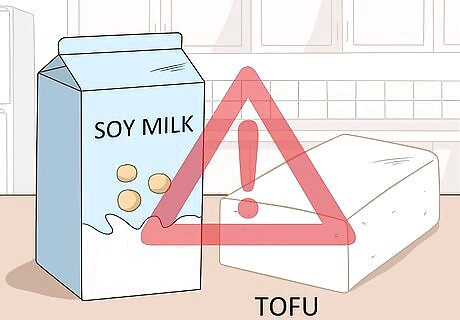
Ask your doctor about the risks and benefits of soy. Soybeans and their by-products, including soy milk and tofu, contain high amounts of phytoestrogen. This substance may increase the amount of estrogen present in your body. However, soy also has a lot of potential health benefits—for instance, some studies suggest it may reduce your risk of prostate cancer. Before you dump your soy milk and tofu, ask your doctor if it’s a good idea for you to avoid soy products. It’s safe for most men to eat soy in moderate quantities. It only tends to become a problem if you eat or drink huge amounts of soy products.
Lifestyle Adjustments
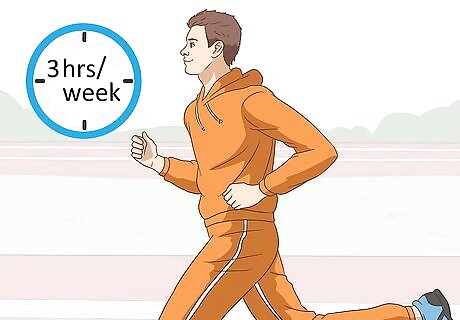
Exercise for at least 2.5 hours every week. When performed regularly, high-intensity activities can help regulate your hormones. If possible, exercise for at least 2.5 hours every week, or around 30 minutes a day, 5 days a week. Focus on aerobic exercises like running, cycling, and swimming. Strength-training exercises, such as weightlifting, may also help balance the hormones that are naturally produced in your muscles, especially as you age.
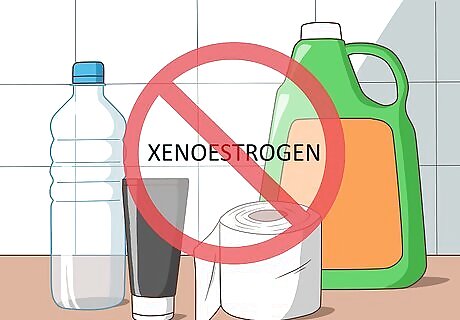
Avoid using products containing xenoestrogens. Xenoestrogens are a class of chemical compounds used in a variety of household products. If you have excessive contact with items containing xenoestrogens, the chemicals can get into your body and increase estrogen growth or cause other hormone problems. Products to avoid or use in limited quantities include: Plastic goods, including containers, bottles, and plastic wrap Yard pesticides and herbicides Beauty products containing phthalates Disinfectants containing ortho-phenylphenol Thermal-printed receipts Cigarettes
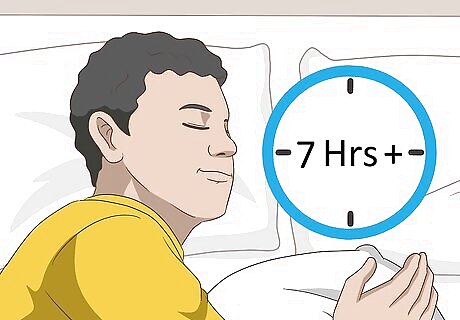
Practice good sleep hygiene to balance your hormones. When you lead a busy life, it’s all too easy to skimp on sleep—or to get into habits that throw off your sleep cycle. However, getting too little sleep at night can mess up your hormone balance and cause you to produce less testosterone. To keep your hormones in balance, go to bed early enough to get at least 7-9 hours of sleep each night. Keeping your room dark and quiet can help you sleep better. In addition, low light levels help stimulate the release of melatonin—a natural sleep hormone that also inhibits estrogen production in your body. If you have trouble getting to sleep at night, establish a relaxing bedtime routine, such as reading a book, meditating, or doing light stretches or exercise. Avoid drinking caffeine or alcohol, doing intense exercise, or looking at bright screens late in the evening.
Medical Treatments
Request that your doctor run a blood test to check your estrogen levels. If you suspect you have high estrogen levels, ask your doctor about a blood test. This is the best way for them to determine how high your estrogen levels are, and what the best treatment options are. Your doctor is most likely to order this test if you have symptoms of excessive estrogen, such as enlarged breasts (gynecomastia), certain kinds of tumors, or problems with sexual function or low libido. If you have been diagnosed with high estrogen levels but notice that your symptoms are progressing, your doctor may want to run periodic blood tests to check your estrogen levels and adjust your treatment.
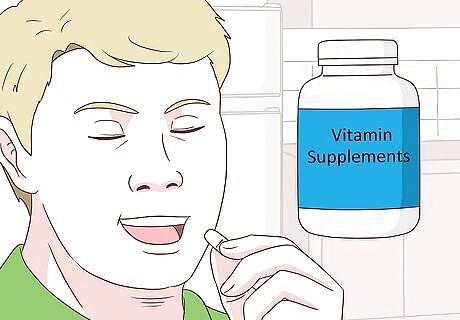
Ask about vitamin supplements to help your body get rid of estrogen. Though not an instant cure, taking dietary supplements may help decrease estrogen production in the body. Always talk to your doctor before starting a new vitamin or supplement. Give them a list of other supplements and medications you’re taking, since these can affect which supplements are safe for you. Your doctor can also recommend appropriate doses. Some supplements that may help include: IH636 grape seed extract Stinging nettle or wild nettle root Chrysin Maca extract
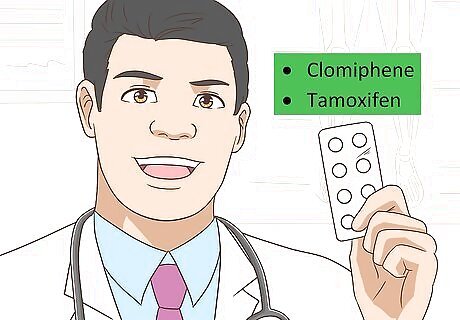
Use SERMs to block estrogen in certain areas of the body. Selective Estrogen Receptor Modulators are drugs that prevent estrogen from affecting certain parts of the body, like the pituitary gland. Ask your doctor about prescription drugs like clomiphene and tamoxifen. Potential side effects of SERMs include bloating, stomach pain, and vision problems, like sensitivity to light and blurred vision. Check with your doctor before taking SERMs along with drugs like bexarotene, parlodel, tagamet, clozapine, cytoxan, nydrazid, femara, tapazole, or cardene.
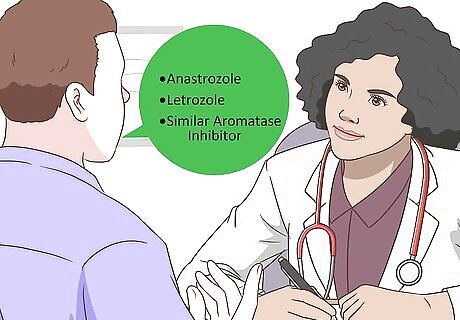
Talk to your doctor about aromatase inhibitors to prevent the growth of estrogen. AIs are a type of drug that reduce estrogen levels by fighting your aromatase enzymes, which take testosterone and convert it into estradiol. Check with your doctor about getting a prescription for anastrozole, letrozole, or a similar aromatase inhibitor. An endocrinologist may prescribe one of these medications if you have a condition such as hypogonadism or certain types of infertility. Blurry vision, chest pain, dizziness, swelling, shortness of breath, and irregular heartbeat are common side effects of taking AIs. Before taking AIs, ask your doctor about potential interactions with drugs such as thalidomide and citalopram.
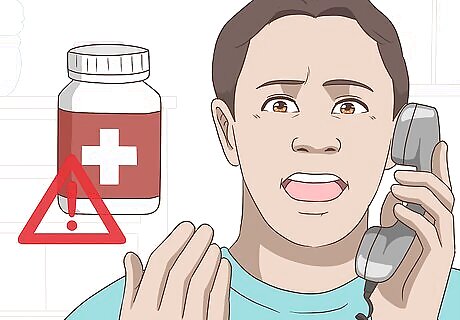
See if your current medications are increasing your estrogen levels. In some cases, your current medications may be creating unexpected reactions within your body, leading to increased estrogen levels. If you suspect this may be the case, contact your doctor and explain the situation. A change in prescription or dosage may be necessary to balance out your hormone levels. Some medications that could affect your hormones include: Anti-androgen medications, which are used to treat prostate cancers and other prostate diseases Anabolic steroids Some AIDS medications Certain anti-anxiety medications or antidepressants Some types of antibiotics Medications used to treat ulcers Cancer medications Calcium channel blockers and other heart medications Medicines like metoclopramide that are used to help empty your stomach















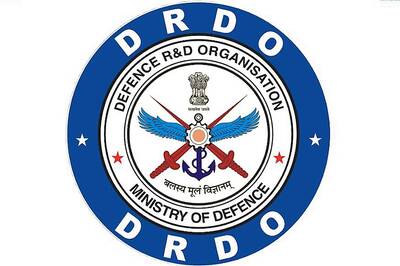



Comments
0 comment